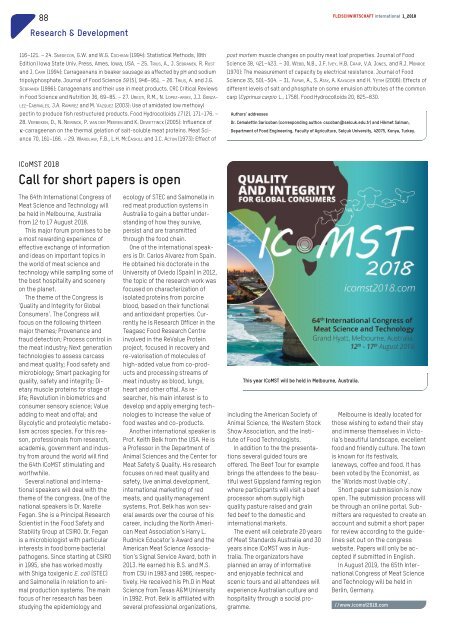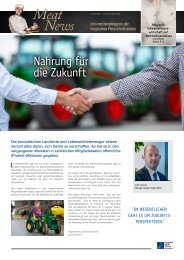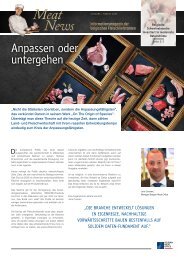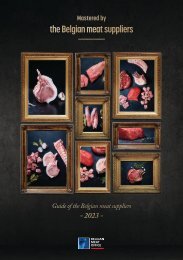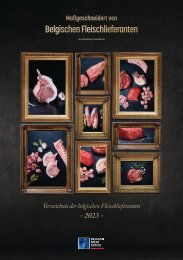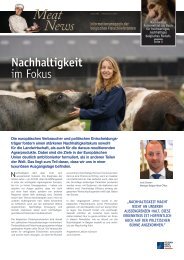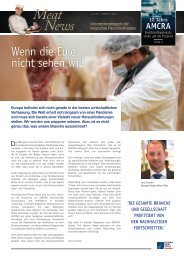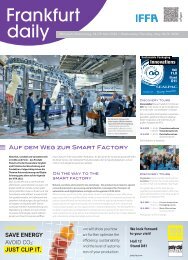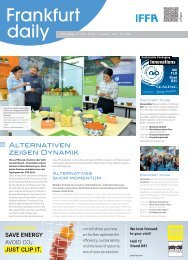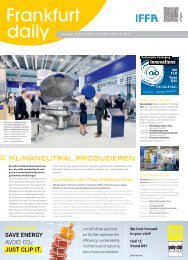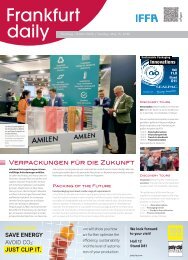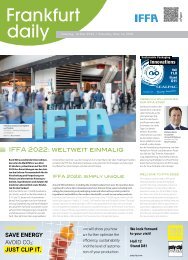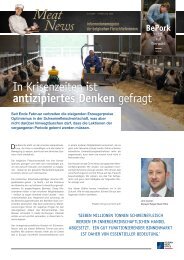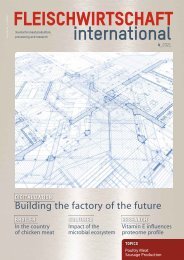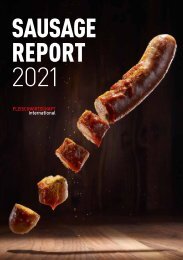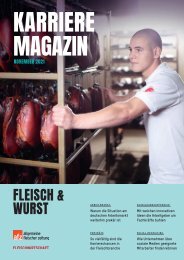FLEISCHWIRTSCHAFT international 1/2018
You also want an ePaper? Increase the reach of your titles
YUMPU automatically turns print PDFs into web optimized ePapers that Google loves.
88<br />
Fleischwirtschaft <strong>international</strong> 1_<strong>2018</strong><br />
Research &Development<br />
116–121. –24. SNEDECOR,G.W. and W.G. COCHRAN (1994): Statistical Methods, (8th<br />
Edition) Iowa State Univ.Press, Ames, Iowa, USA. –25. TRIUS,A., J. SEBRANEK,R.RUST<br />
and J. CARR (1994): Carrageenans in beaker sausage as affected by pH and sodium<br />
tripolyphosphate. Journal of Food Science 59 (5), 946–951. –26. TRIUS,A.and J.G.<br />
SEBRANEK (1996): Carrageenans and their use in meat products. CRC Critical Reviews<br />
in Food Science and Nutrition 36, 69–85. –27. URESTI,R.M., N. LOPEZ-ARIAS,J.J. GONZA-<br />
LEZ-CABRIALES,J.A. RAMIREZ and M. VAZQUEZ (2003): Use of amidated low methoxyl<br />
pectin to produce fish restructured products. Food Hydrocolloids 17 (2), 171–176. –<br />
28. VERBEKEN,D., N. NEIRINCK,P.vAN DER MEEREN and K. DEWETTINCK (2005): Influence of<br />
κ-carrageenan on the thermal gelation of salt-soluble meat proteins. Meat Science<br />
70, 161–166. –29. WARDLAW,F.B., L.H. MCCASKILL and J.C. ACTON (1973): Effect of<br />
post mortem muscle changes on poultry meat loaf properties. Journal of Food<br />
Science 38, 421–423. –30. WEBB,N.B., J.F. IVEY,H.B. CRAIP,V.A. JONES,and R.J. MONROE<br />
(1970): The measurement of capacity by electrical resistance. Journal of Food<br />
Science 35, 501–504. –31. YAPAR,A., S. ATAY,A.KAYACIER and H. YETIM (2006): Effects of<br />
different levels of salt and phosphate on some emulsion attributes of the common<br />
carp (Cyprinus carpio L., 1758). Food Hydrocolloids 20, 825–830.<br />
Authors’ addresses<br />
Dr.Cemalettin Saricoban (corresponding author: cscoban@selcuk.edu.tr) and Hikmet Salman,<br />
Department of Food Engineering, Faculty of Agriculture, Selçuk University, 42075, Konya, Turkey.<br />
ICoMST <strong>2018</strong><br />
Call for short papers is open<br />
The 64th International Congress of<br />
Meat Science and Technology will<br />
be held in Melbourne, Australia<br />
from 12 to 17 August <strong>2018</strong>.<br />
This major forum promises to be<br />
amost rewarding experience of<br />
effective exchange of information<br />
and ideas on important topics in<br />
the world of meat science and<br />
technology while sampling some of<br />
the best hospitality and scenery<br />
on the planet.<br />
The theme of the Congress is<br />
‘Quality and Integrity for Global<br />
Consumers’. The Congress will<br />
focus on the following thirteen<br />
major themes; Provenance and<br />
fraud detection; Process control in<br />
the meat industry; Next generation<br />
technologies to assess carcass<br />
and meat quality; Food safety and<br />
microbiology; Smart packaging for<br />
quality, safety and integrity; Dietary<br />
muscle proteins for stage of<br />
life; Revolution in biometrics and<br />
consumer sensory science; Value<br />
adding to meat and offal; and<br />
Glycolytic and proteolytic metabolism<br />
across species. For this reason,<br />
professionals from research,<br />
academia, government and industry<br />
from around the world will find<br />
the 64th ICoMST stimulating and<br />
worthwhile.<br />
Several national and <strong>international</strong><br />
speakers will deal with the<br />
theme of the congress. One of the<br />
national speakers is Dr.Narelle<br />
Fegan. She is aPrincipal Research<br />
Scientist in the Food Safety and<br />
Stability Group at CSIRO. Dr.Fegan<br />
is amicrobiologist with particular<br />
interests in food borne bacterial<br />
pathogens. Since starting at CSIRO<br />
in 1995, she has worked mostly<br />
with Shiga toxigenic E. coli (STEC)<br />
and Salmonella in relation to animal<br />
production systems. The main<br />
focus of her research has been<br />
studying the epidemiology and<br />
ecology of STEC and Salmonella in<br />
red meat production systems in<br />
Australia to gain abetter understanding<br />
of how they survive,<br />
persist and are transmitted<br />
through the food chain.<br />
One of the <strong>international</strong> speakers<br />
is Dr.Carlos Alvarez from Spain.<br />
He obtained his doctorate in the<br />
University of Oviedo (Spain) in 2012,<br />
the topic of the research work was<br />
focused on characterization of<br />
isolated proteins from porcine<br />
blood, based on their functional<br />
and antioxidant properties. CurrentlyheisResearch<br />
Officer in the<br />
Teagasc Food Research Centre<br />
involved in the ReValue Protein<br />
project, focused in recovery and<br />
re-valorisation of molecules of<br />
high-added value from co-products<br />
and processing streams of<br />
meat industry as blood, lungs,<br />
heart and other offal. As researcher,<br />
his main interest is to<br />
develop and applyemerging technologies<br />
to increase the value of<br />
food wastes and co-products.<br />
Another <strong>international</strong> speaker is<br />
Prof. Keith Belk from the USA. He is<br />
aProfessor in the Department of<br />
Animal Sciences and the Center for<br />
Meat Safety &Quality.His research<br />
focuses on red meat quality and<br />
safety, live animal development,<br />
<strong>international</strong> marketing of red<br />
meats, and quality management<br />
systems. Prof. Belk has won several<br />
awards over the course of his<br />
career, including the North American<br />
Meat Association’sHarry L.<br />
Rudnick Educator’s Award and the<br />
American Meat Science Association’sSignal<br />
Service Award, both in<br />
2013.Heearned his B.S. and M.S.<br />
from CSU in 1983 and 1986, respectively.<br />
He received his Ph.D in Meat<br />
Science from Texas A&M University<br />
in 1992. Prof. Belk is affiliated with<br />
several professional organizations,<br />
This year ICoMST will be held in Melbourne, Australia.<br />
including the American Society of<br />
Animal Science, the Western Stock<br />
Show Association, and the Institute<br />
of Food Technologists.<br />
In addition to the the presentations<br />
several guided tours are<br />
offered. The Beef Tour for example<br />
brings the attendees to the beautiful<br />
west Gippsland farming region<br />
where participants will visit abeef<br />
processor whom supplyhigh<br />
quality pasture raised and grain<br />
fed beef to the domestic and<br />
<strong>international</strong> markets.<br />
The event will celebrate 20 years<br />
of Meat Standards Australia and 30<br />
years since ICoMST was in Australia.<br />
The organizators have<br />
planned an array of informative<br />
and enjoyable technical and<br />
scenic tours and all attendees will<br />
experience Australian culture and<br />
hospitality through asocial programme.<br />
Melbourne is ideallylocated for<br />
those wishing to extend their stay<br />
and immerse themselves in Victoria’sbeautiful<br />
landscape, excellent<br />
food and friendlyculture. The town<br />
is known for its festivals,<br />
laneways, coffee and food. It has<br />
been voted by the Economist, as<br />
the ‘Worlds most livable city’.<br />
Short paper submission is now<br />
open. The submission process will<br />
be through an online portal. Submitters<br />
are requested to create an<br />
account and submit ashort paper<br />
for review according to the guidelines<br />
set out on the congress<br />
website. Papers will onlybeaccepted<br />
if submitted in English.<br />
In August 2019,the 65th International<br />
Congress of Meat Science<br />
and Technology will be held in<br />
Berlin, Germany.<br />
//www.icomst<strong>2018</strong>.com


